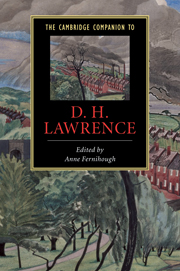Book contents
- Frontmatter
- Introduction
- Part 1 Texts
- 1 Ideas, histories, generations and beliefs: the early novels to Sons and Lovers
- 2 Narrating sexuality: The Rainbow
- 3 Sex and the nation: ‘The Prussian Officer’ and Women in Love
- 4 Decolonising imagination: Lawrence in the 1920s
- 5 Work and selfhood in Lady Chatterley’s Lover
- 6 Lawrence’s tales
- 7 Lawrence’s poetry
- 8 Lawrence as dramatist
- Part 2 Contexts and critical issues
- Guide to further reading
- Index
4 - Decolonising imagination: Lawrence in the 1920s
from Part 1 - Texts
Published online by Cambridge University Press: 28 May 2006
- Frontmatter
- Introduction
- Part 1 Texts
- 1 Ideas, histories, generations and beliefs: the early novels to Sons and Lovers
- 2 Narrating sexuality: The Rainbow
- 3 Sex and the nation: ‘The Prussian Officer’ and Women in Love
- 4 Decolonising imagination: Lawrence in the 1920s
- 5 Work and selfhood in Lady Chatterley’s Lover
- 6 Lawrence’s tales
- 7 Lawrence’s poetry
- 8 Lawrence as dramatist
- Part 2 Contexts and critical issues
- Guide to further reading
- Index
Summary
Imagining-and its difficulty
For Doris Lessing, racism is an 'atrophy of the imagination'. Many factors combine to block our responsiveness to people of other races and cultures: attitudes imbibed unconsciously at our mother's knee and from fathers and elders, peer-group pressure, the limitations of our education and of what we read, the conditionings of our post-colonial and still largely racist societies. If, however, as Lessing implies, imagination is antipathetic to racism, can a writer (sometimes) decolonise his vision? It would seem so; and no Englishborn author of the early twentieth century went further in this than D. H. Lawrence, through his encounter with the native peoples of North America. However, in tracing this process, we must not fail in imagination ourselves, by condescending to the past. We need to see just how hard it could be (and is) to unscale one's eyes from the prejudices of the time, and how easy therefore to relapse into a conventional self. Imagination could prove intermittent.
- Type
- Chapter
- Information
- The Cambridge Companion to D. H. Lawrence , pp. 67 - 86Publisher: Cambridge University PressPrint publication year: 2001

